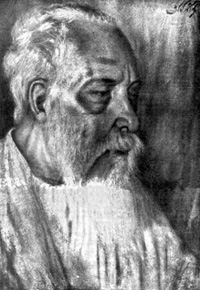Tagore, Maharshi Debendranath

Tagore, Maharshi Debendranath (1817-1905) preacher of Brahma faith and philosopher and the father of all talents, was born on 15 May 1817 at the tagore family of Jorasanko in calcutta. Prince dwarkanath tagore was his father and Digambari Devi was his mother. Nobel Laureate rabindranath tagore was his son.
Debendranath studied at home from 1823 to 1825. In 1827 he got admitted to Anglo-Hindu College, which had been established by raja rammohun roy. After studying there for some time he began looking after his father's property and business as well as cultivating philosophy and religion. The death of his grandmother in 1938 brought about a psychological change in him. He became largely otherworldly and began studying mahabharata, upanisads, eastern and western philosophies and many other subjects. He soon lost interest in worldly affairs and started exploring the mysteries of God.
He established the 'Tattaranjani Sabha' in 1839 to facilitate discussions on different philosophies this was later renamed as Tattvabodhini Sabha. At this time he published a Bangla translation of Kathopanisad (1840).
In 1842, Debendranath took charge of the Tattvabodhini Sabha and Brahma Samaj. The next year tattvabodhini patrika appeared with his financial support and under the editorship of akshay kumar datta. The journal started publishing the Upanisads along with Debendranath's Bangla translation. It was at his initiative that the vedas started being read at open meetings.
In 1844, Debendranath introduced the forms of Brahma worship and from 1845 the Brahma Samaj began practising them. Long years of exercise with the scriptures convinced him that it was not possible to base the Brahma religion only on the Upanisads. So in 1848 he started serialising the Bangla translation of Rg Veda in the Tattvabodhini Patrika. This was published as Brahmadharma in 1869. Debendranath's other book, Atmatattvavidya, was published in 1850. In 1853 he was made secretary of the Tattvabodhini Sabha and in 1859 he established a Brahma school.
Debendranath stopped ceremonies of Hindu pujas and introduced 'Magh festival', 'Nababarsa', 'Diksa Din' and similar festivals. In 1867 he bought a vast tract of land called Bhubandanga in Birbhum district of west bengal and set up a hermitage there. This hermitage is famous now as santiniketan. He was also a founder of the bethune society of the Hindu Charitable Institution.
Debendranath was involved in active politics for some time. He was made secretary of the british indian association when it was set up on 31 October 1851. He made relentless efforts to remit the chowkidari tax on the poor village people and sent to the British parliament a representation demanding autonomy for India. Debendranath was enthusiastic about remarriage of Hindu widows and opposed child marriage and polygamy. He made a significant contribution in spreading education in his country. In 1867 radhakanta deb called him a 'protector of the national religion' and the Brahma Samaj gave him the title of 'Maharshi' for having preventing Indian youths from coming under the influence of christianity. He died in Calcutta on 19 January 1905. [Pradip Kumar Roy]
